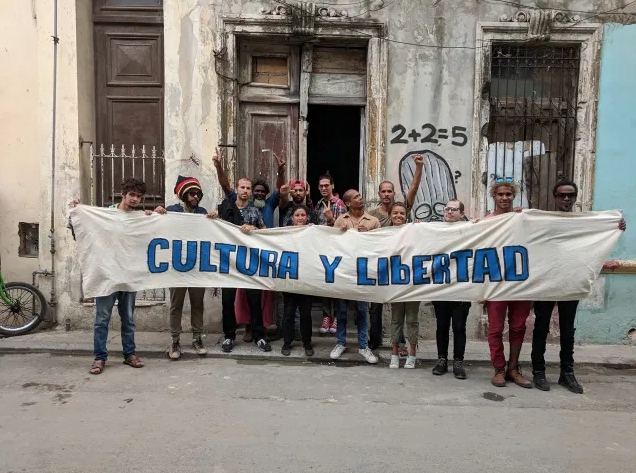On May 21, the newspaper Granma, Official Organ of the Central Committee of the Communist Party of Cuba, published an article entitled “Protests and repression continue in Colombia”. It was not the first time that State repression against citizens was denounced. The same happened in the face of the demonstrations in Chile in 2019 with an article titled: “Data demonstrate police brutality in Chile”, and in the face of those in the United States in 2020 where a rather more yellowish headline asked: “Where are the killer police officers manufactured? However, in the face of police violence, harassment, arbitrary arrests and kidnapping of opponents, journalists and artists in their own country, these same newspapers remain silent.
The black spring of 2003
In the early morning of March 18, 2003, in a coordinated action by agents of the Department of State Security, or Cuban political police, 75 people were arrested, including opponents, journalists and activists accused of collaborating with the “enemy” and supporting the U.S. economic blockade of Cuba. In addition to the arrests, computers, files, photos, typewriters, fax machines, among other elements that were used as evidence were confiscated.
Days later, between April 3 and 7, summary trials were held in which they were sentenced to prison terms ranging from six to 30 years, without the right to a fair trial, or at least to a defense. This was intended to send a political message to the U.S. government in order to discourage any kind of aggression towards Cuba, using dissidents inside the island as scapegoats.
In order to give a semblance of legality to the action, Law 88 of 1999, or “Gag Law”, was used, which established the purpose of “criminalizing and punishing those acts aimed at supporting, facilitating or collaborating with the objectives of the Helms-Burton Act, the blockade and the economic war against our people, aimed at disrupting the internal order, destabilizing the country and liquidating the Socialist State and the independence of Cuba”. In other words, any action in rejection of the actions of the Cuban government and which could be associated with persons or members of the U.S. government made it possible to use this provision to punish, persecute and imprison.
And although many of the accused did not even know James Cason, head of the U.S. interests office in Cuba, this official was used as an excuse for mass imprisonment, claiming that they “participated in subversive activities” led by him. The truth is that while these opponents, activists and journalists had to face this totalitarian justice, Fidel Castro did not carry out any reprisals against the U.S. government official and only used his own citizens as a way to demonstrate his power.
The black spring of 2021
Although repressive actions have not ceased since 2003 and there have been many cruel springs for Cubans who think differently, this spring of 2021 was special because the VIII Congress of the Communist Party of Cuba (PCC) would be held in which Raul Castro would retire from public life. Thus, in anticipation of any kind of opposition action, the members of the Patriotic Union of Cuba (UNPACU) were surrounded by the police and their surveillance and control by the State Security Department was increased.
As a result of this pre-emptive attack against unarmed and peaceful citizens, 60 members of UNPACU began a hunger strike in rejection of the unjustified repression and surveillance. 26 days after the announcement by José Daniel Ferrer, leader of UNPACU, the hunger strike ended following the end of the police siege of the organization’s headquarters in Altamira in Santiago de Cuba. But far from ending the days of repression, new forms of intimidation, persecution, kidnapping and imprisonment would begin.
At the beginning of the PCC Congress, the artist Luis Manuel Otero Alcántara made a performance at his home to recreate through a “garrote vil” the precariousness of life and the “imprisonment” suffered by Cuban society. The State Security Department was not long in coming and, in addition to bursting in without a warrant and arresting the artist, seized his works and began the dark days of April. During April the artist was repeatedly detained, as well as several other activists, and was then held in the Calixto Garcia hospital for nearly a month.
The banning of protests
On April 30, Esteban Rodríguez decided, after not being able to visit Luis Manuel Otero Alcántara, to demonstrate in the middle of Obispo Street in Havana along with other activists and journalists. It was a peaceful expression of citizens against repression. However, any demonstration of discontent is unacceptable in a dictatorship and for this reason Esteban and his companions were taken by State Security to a police station. Since that date they have been detained on charges of “public disorder and resistance”. While some have been released, others like Esteban will be transferred to maximum security prisons.
Esteban is not the only one this spring that has had many other names, like that of journalist Ileana Alvarez, detained at her home for reporting; Manuel de la Cruz was expelled from the Institute where he worked for participating in a party with Luis Manuel Otero Alcantara; Maykel Osorbo, a rapper, was repeatedly detained and taken without objective cause to a maximum security prison.
In this way, Miguel Díaz-Canel seems to copy the strategies of 2003 to show his power and discourage any source of discontent. Meanwhile, the pro-government media dresses up as democrats and defenders of human rights when it comes to judging repression in other countries. But when it comes to reporting on the repression against the UNPACU, Granma itself says that these are “subversive focal points”, and alludes to the hospital confinement of Luis Manuel Otero Alcántara as “the most recent farce against Cuba”.












